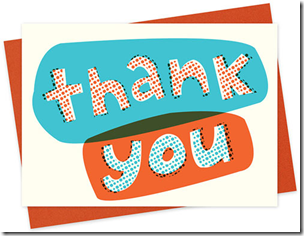Thank you notes: Should you send an email or write a note?
/A recent Infographic on thank you notes caught my attention:
It's a lovely infographic, but I disagree with the process of decision making that it outlines.
Instead, I would like to propose my own rules about when you can write an email and when you must send a physical thank you note.
When determining whether an email or an actual thank you note is required, ask yourself the following questions:
1. Is the recipient the kind of inane and pedantic person who would be offended by an email in lieu of a handwritten thank you note?
If NO, send an email. Not only is it more efficient, but it allows you to say more in less time.
If YES, answer the following:
2. Is the recipient someone whose opinions you care about?
If NO, send an email.
If YES, consider sending an email. If you're still uncertain, answer the following question.
3. Is the recipient the kind of small-minded, vacuous person who might underhandedly complain about your failure to send an actual thank you note to people who you know and respect?
If NO, send the email.
If YES, grudgingly send the thank you note.
When these rules are unavailable to you, you can always rely on this one question to arrive at an equitable solution:
Is the recipient a backwards-thinking, arcane traditionalist capable of underhanded, passive-aggressive, prickish behavior with far too much time on their hands?
If NO, send an email.
If YES, send a thank you note. Or better yet, eradicate this person from your life entirely if possible.
I sent an email in lieu of a thank you note about 90% of the time. I am capable to write far more meaningful and memorable things in an email than I can in a thank you note, and I usually do. As untraditional and impersonal an email may seem to some, if done right, it can be far more meaningful and impactful than a small piece of card stock with 3-5 scribbled sentences.
When I send a physical thank you note, it's almost always in situations that still demand a physical thank you note (in response to gifts, for example, though even then, I will send an email to close friends) or when the recipient is likely to be offended by the email and his or her response to the email will be more troublesome to me than the actual writing of the thank you note.
It should also be noted that if you are a person who thinks that a thank you note sent via email is never acceptable, you should know that you are a dinosaur. You are slowly but surely becoming extinct. You may enjoy your thank you note perch high above the masses, but please know that the world is moving on without you.
Most of us understand that it's the thought that counts. It's a lesson we were taught as children, and it remains true today.
The thought - contrary to arcane and dwindling belief - does not require ink, envelope, and postage to count.

